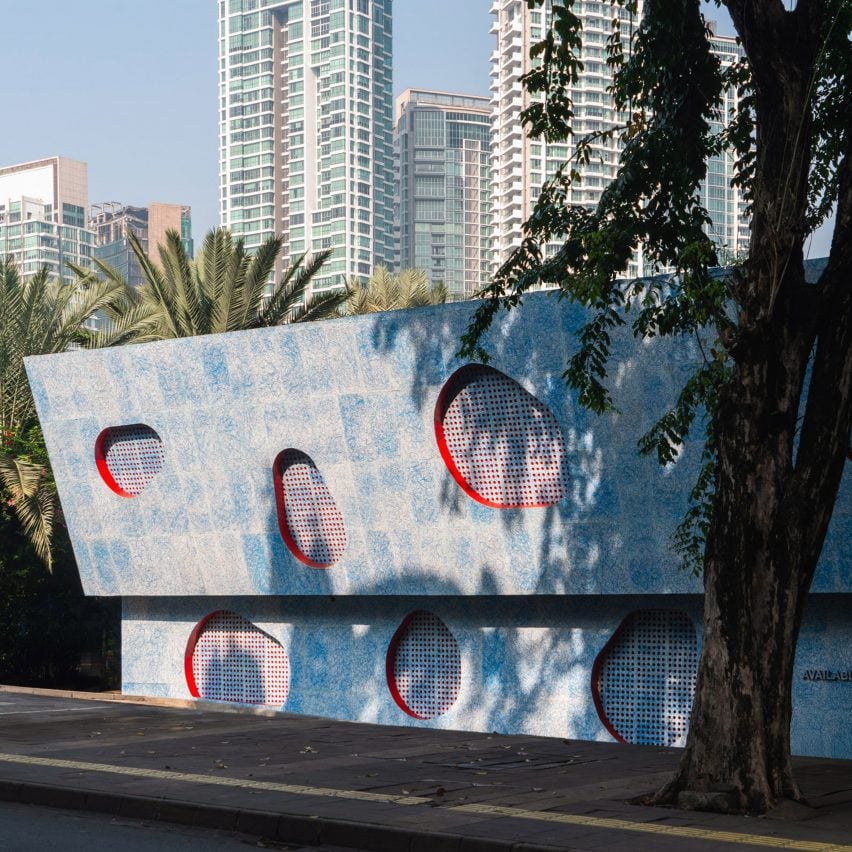Multidisciplinary design studio Space Available has established a community centre in Jakarta, Indonesia, featuring a conversation pit containing recycling machines and furniture made from ocean plastic.
Space Available founder Daniel Mitchell set up the Self Care Community Centre with his wife, Hilda Sembiring Mitchell, who is originally from Jakarta and grew up near the Kemang area, where the centre is located.

The facility takes over a building designed more than two decades ago by prominent local architect Andra Matin, which had been used for various purposes, including as a cultural hub, before declining foot traffic in Kemang led to it falling into disuse.
Space Available partnered with cultural collective A3000 to develop a proposal for revitalising the building and the neighbourhood by integrating community-driven activity spaces alongside a retail space.

The SCCC’s largely open interior and modular configuration incorporates spaces for movement-based activities such as running and dance, along with a dedicated meditation room and a gallery showcasing art, design and material innovation.
Other spaces contained within the building include a workshop for recycling local waste into new objects, as well as a restaurant and bar, a listening library and a communal reading room.

Some of these are accessible to all, while others are available through a free community membership programme that provides access to workshops and events.
“The Self Care Community Centre isn’t just about selling products,” explained Mitchell, who collaborated with designer Andika Wahyu and Jakarta-based architects Sidarta and Sandaja on the project.
“It’s about creating an ecosystem of cultural wellbeing in service of community, where people can engage in rituals of individual and collective wellbeing.”

Space Available is known for its radical approach to reuse and recycling, often involving the transformation of waste plastic into materials used for architectural elements or furniture.
For the Self Care Community Centre, the studio worked with artisans in Jakarta and across Indonesia to craft the building’s facade and interiors from over 11 tonnes of locally recycled plastic.
The refurbished exterior is clad in recycled plastic panels, interrupted by irregular oval cutouts designed to evoke the fruits of the Kemang trees that gave the area its name.
The designers chose to use their signature blue colour to give the building a strong presence when viewed from the street.

Internally, a corridor illuminated in red creates an immersive entrance experience that emphasises the transition from the hectic outside world into the calm, reflective inner space.
“The red tones bring energy and balance to the cooler blues, supporting the concept of connecting inner and outer worlds through light, texture, and colour,” said Mitchell.

One of the interior’s standout features is a conversation pit equipped with plastic recycling machines and upcycling stations that visitors can use to repair garments.
A restaurant and bar area features sculptural seating, handcrafted for Space Available by master weaver Nano Uhero using recycled plastic rope and natural rattan.

The curvaceous sofas combine with shelves and side tables made from recycled ocean-bound plastics. The furniture, featuring Space Available’s signature hand-swirled pattern, is designed to slot together without the need for complex fixings or glue.
The project follows a similar approach to that adopted for the Museum of Space Available, which the studio completed in 2022 as a venue focused on innovations in plastic recycling, biomaterials and circular living.

MoSA features a facade made of 200,000 recycled plastic bottles, which was created using a process developed by Space Available to make use of the vast amounts of plastic waste that often end up polluting the oceans around Bali.
Space Available previously used recycled plastic for a furniture collection produced in collaboration with techno DJ Peggy Gou. The studio’s own workshop and office space also features a mezzanine clad in offcuts from its plastic recycling projects.
The photography is by Ernest Theofilus.
The post Space Available crafts Self Care Community Centre from 11 tonnes of plastic waste appeared first on Dezeen.

